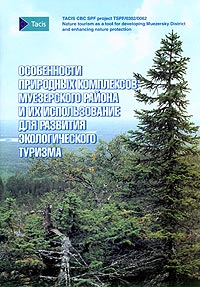 |
This publication has been produced with the assistance of the European Union. The contents of the publication is the sole responsibility of City of Lieksa and can in no way be taken to reflect the views of the European Union.
|
|
| Natural complexes of the Muezersky District and their use in nature tourism
The book briefly describes the natural complexes and their current
condition, points out the most valuable nature objects (in terms of
nature conservation and tourism), gives some recommendations on the
study of the flora and fauna. A short list of recommended readings is
provided at the end of each chapter. The publication is supplied with maps,
photographs and other illustrations.
Nature protection and ecotourism (learning aid for schoolchildren, graduate students and tourism actors)
This collective monograph shaped as a learning aid deals with problems of ecotourism development and related nature conservation issues. The book is meant for a broad readership - schoolchildren, graduate students, managers and staff of tourist companies, trainees of further education and re-training courses, post-graduate students, staff of nature conservation organisations. Scientific pre-requisites for the development of ecotourism and nature conservation in Russia and Republic of Karelia are considered, the directions and results of modern studies in the sphere are analysed. Special focus is placed on issues of environmental education in schools and universities, the learning materials currently used in Russia to teach ecology are analysed. Examples and techniques of creating nature trails and educational routes are provided. The book comprises the following major sections:
The concept and principles of ecotourism. Ecotourism implies "all forms of recreation in natural areas that do not harm natural complexes, benefit the conservation of the site and the economic well-being of local residents" (WWF). In other words, it is sustainable, nature-oriented tourism and recreation. International practices in ecotourism are based on the following basic principles:
Thus, organisations developing ecotourism strive for their business to practically contribute to long-term nature conservation and local development. Ecotourism development is not just business, and gaining as much profit as possible is not the aim in itself. Potential for ecotourism development in Russia. Ideas of ecotourism and conservation have undergone a long way of evolution - from the ethic-esthetic approach in the pre-revolutionary Russia and scientific-utilitarian approach during the USSR times to the humanistic approach in modern Russia. Pre-requisites for ecotourism development in Russia are provided by a large number of protected areas holding significant potential:
State-of-the-art in nature conservation and ecotourism in Karelia. Republic of Karelia currently has 266 protected nature objects with a total area of 957521,2 ha, i.e. 5.3% of the republic's total area (tab.). The first PA of Karelia - the "Kivach" strict nature reserve - was designated in 1931. Most PA's were organised between 1960 and 1996. Current protected nature fund of Republic of Karelia (as of 01.01.2004)
Protected areas in Republic of Karelia cover a total of 1897,600 ha or 8.0% of the republic's area. Various forms of ecotourism are either practised or planned for implementation in these areas. Challenges in ecotourism in Karelia. Ecotourism development in the republic faces a number of serious problems, which solution requires a systemic approach. The problems to be mentioned are:
Besides, there exist also general problems not specific to ecotourism, but related to any kind of tourism. These are:
Environmental education. The aim of environmental education is to mould the environmental culture of the individual and the society as a set of practical and spiritual experience of interactions between people and nature securing the survival and development of the humanity. The environmental education system rests on the following principles: Humanisation approach, according to which environmental education programmes should reflect moral and legal standards. Scientific approach, which implies a sufficient level of reliable academic information about the organisation of the biosphere as the living environment for humans, study of objective patterns in the sustainable development of natural-social systems. Prognostic approach focuses on the problem of forming the ability to foresee and plan the conditions for the preservation of the biosphere gene pool and the health of human populations in schoolchildren. The principle of
interrelated teaching of global, regional and local aspects of ecology focuses
on the identification of environmental problems as the consequence of improper
actions of people neglecting the ecological imperative. Continuity principle implies gradual, step-by-step formation of the personal environmental responsibility. Systemic approach ensures holistic organisation of environmental education including all its components - aims, content, methods, tools, as well as forms of various activities. There now exist three most common and widely recognised modes of environmental education in schools:
In accordance with these three modes of environmental education, the paper tells about the requirements to the skills and knowledge of the pupils, and approaches to teaching methods. The teaching method regarded as the most promising one is the nature trail method. The idea of nature trails is plain and obvious - allowing passage along a strictly designated route established in a natural or semi-natural landscape. This method reduces the pressure on the environment from mass visitation to a minimum, while helping people see many things in the natural environment. Each trail is different owing to unique landscapes and creativity of those who organise these nature "museums", which sometimes turn into "theatres" where one can observe "scenes" from the normally hidden life of nature. The technique for making nature trails and sample descriptions of existing trails created in the Paanajarvi National Park by experts and students from the Karelian State Pedagogical University together with schoolchildren are provided. Experts: E. Nemkovich, Yu. Saveliev, T. Hilkov | ||||||||||||||||||||||||||||||||||||||||||||||||||||||||||||||||||||||||||||||||
|